Liberal leadership hopefuls target Trump, Poilievre, and Canada’s economy in final debate
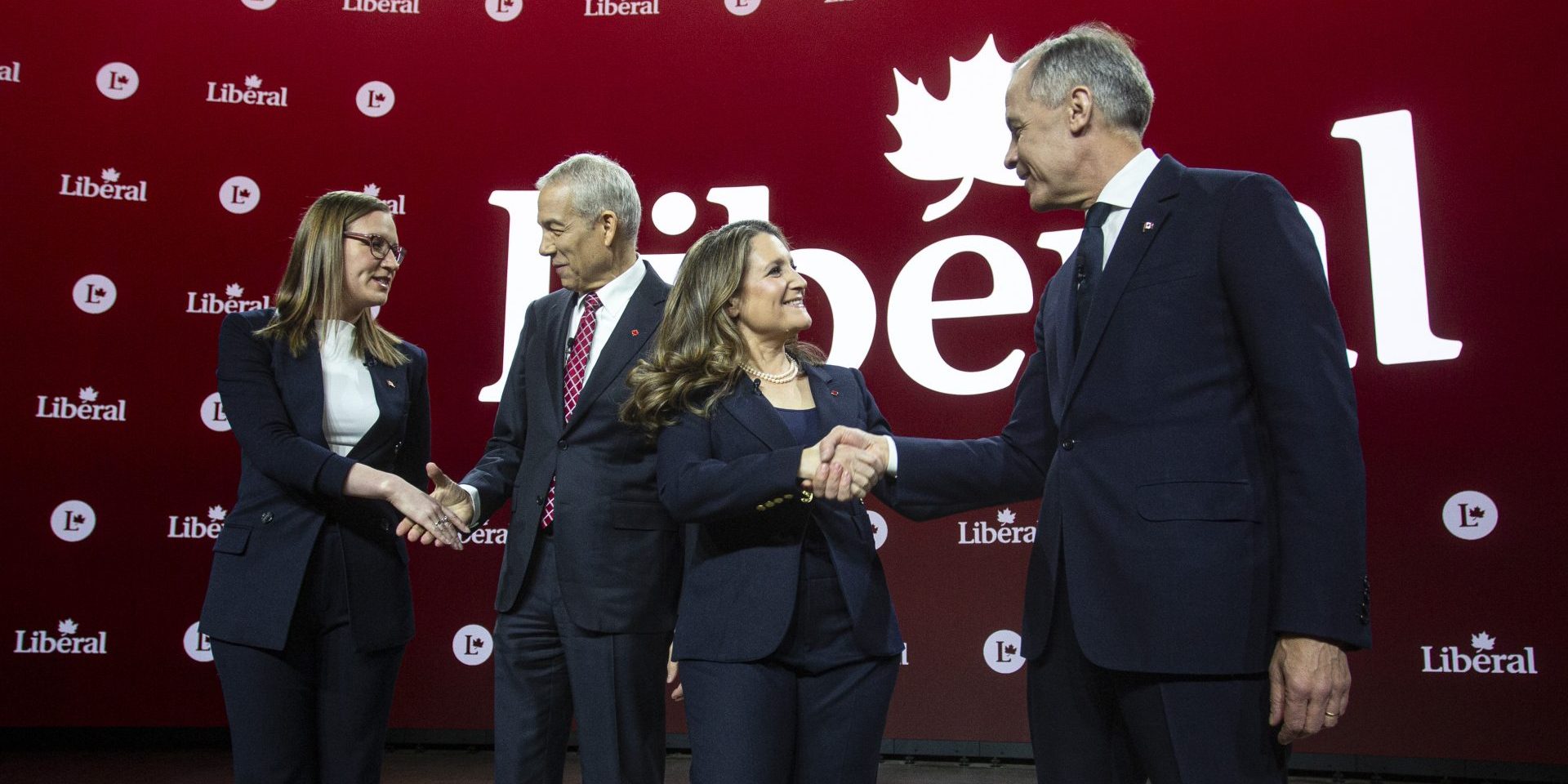
The four remaining Liberal leadership candidates squared off in Montreal for round two in the English-language debate. Despite not being on the stage, U.S. President Donald Trump loomed large over the evening.
While there were no knockout punches, the four candidates vying to be Canada’s next prime minister were more comfortable throwing jabs at each other in their mother tongue on Feb. 25 than the previous night’s French-language debate—most notably Karina Gould at front-runner Mark Carney.
This was a departure from the previous night, where former Bank of Canada governor Carney, former deputy prime minister and finance minister Chrystia Freeland (University-Rosedale, Ont.), former government House leader Gould (Burlington, Ont.), and former MP Frank Baylis seemed, for the most part, in accordance with each other.
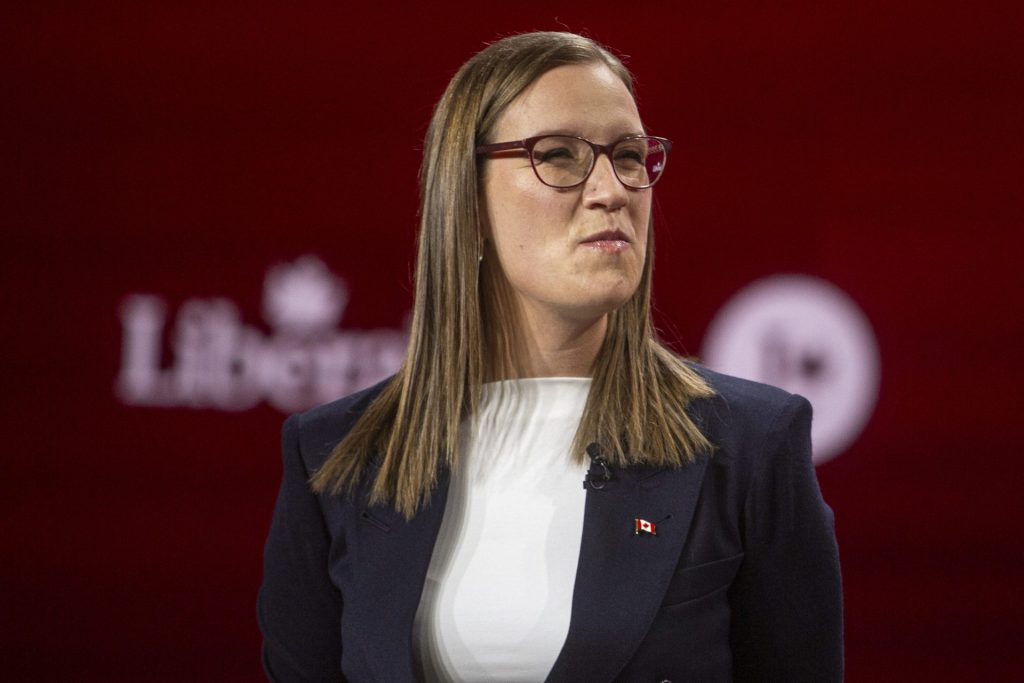
When asked about her more fiery debate style in the English round, Gould told reporters afterwards that it was “a debate amongst friends,” but the real debate would come against Conservative Leader Pierre Poilievre (Carleton, Ont.), Bloc Québécois Leader Yves-François Blanchet (Beloeil-Chambly, Que.), against NDP Leader Jagmeet Singh (Burnaby South, B.C.).
“We need to ensure that whoever is leading our party is debate ready in English and French,” she said. “And what became clear to me, both last night and tonight, that I’m the only person on that stage that is ready to take on the opposition.”
The two-hour debate was split into four sections: Canada’s place in the world/Canada-U.S. relations, the economy, supporting Canadians, and climate change.
Taking on Trump
It was no surprise that U.S. President Donald Trump continued to be the key focus of the leadership contenders—he featured prominently in the French-language debate as well. Trump’s threat of 25-per-cent tariffs on all Canadian goods and 10-per-cent levies on energy exports are set to unpause in a week on March 4. And with the added threats to Canadian sovereignty, the topic of Trump led off the night’s debate.
Debate moderator Hannah Thibedeau first asked the contenders how they would “stand up for Canada,” and why each is the best positioned to do that job.
Baylis was the first to answer and explained his extensive business experience negotiating with Americans can help Canada.
“I know how to deal with him, and it’s important to understand that Mr. Trump is a bully, and you do not give one inch to a bully,” said Baylis. “We cannot be learning this on the job. That’s where I come in. I have the experience and the expertise to deal with Donald Trump.”
Carney, a former central banker for Canada and England, flexed his experience managing the Canadian economy during the 2008 recession and the British economy during Brexit.
“In a situation like this, you need experience in terms of crisis management,” said Carney, who pitched his “negotiating skills, economic expertise,” and ability to “build a strong economy” as the best strategy to counter Trump’s threat.
“The stakes are very, very high. This is a serious crisis,” Carney said, “a crisis of sovereignty.”
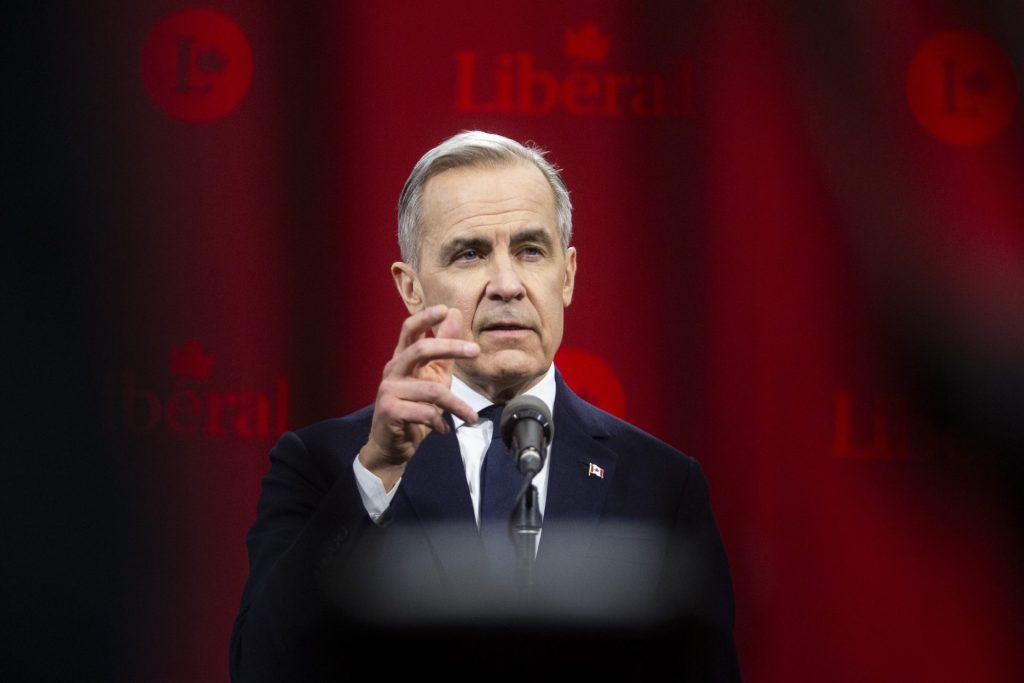
Gould mentioned her time managing the somewhat raucous parliamentary proceedings as government House leader.
“Men like Donald Trump have always underestimated leaders like me, but they underestimate me, and that’s their mistake. And I think as Canadians, we know what that’s like. We know how to stand up for who we are and to stand up to bullies, and that’s something that I’ve been doing in the House of Commons for the last decade. I know how to stand up to Pierre Poilievre, who, when it comes to Donald Trump, would rather imitate him than stand up for Canada,” said Gould.
Of the four candidates, Freeland was the only one on stage who had direct experience negotiating with a Trump administration—as the lead minister when NAFTA was renegotiated during the president’s first term.
“We can’t change him, but we can outwit him. And the way to do that is by using our leverage, by recognizing that, yes, we depend on the U.S., but they depend on us, too,” said Freeland. “A smart, tough negotiator who stands up to Trump can activate those Americans who need us, get them to lobby him. That’s how we get a win-win outcome. That’s how Canada wins.”
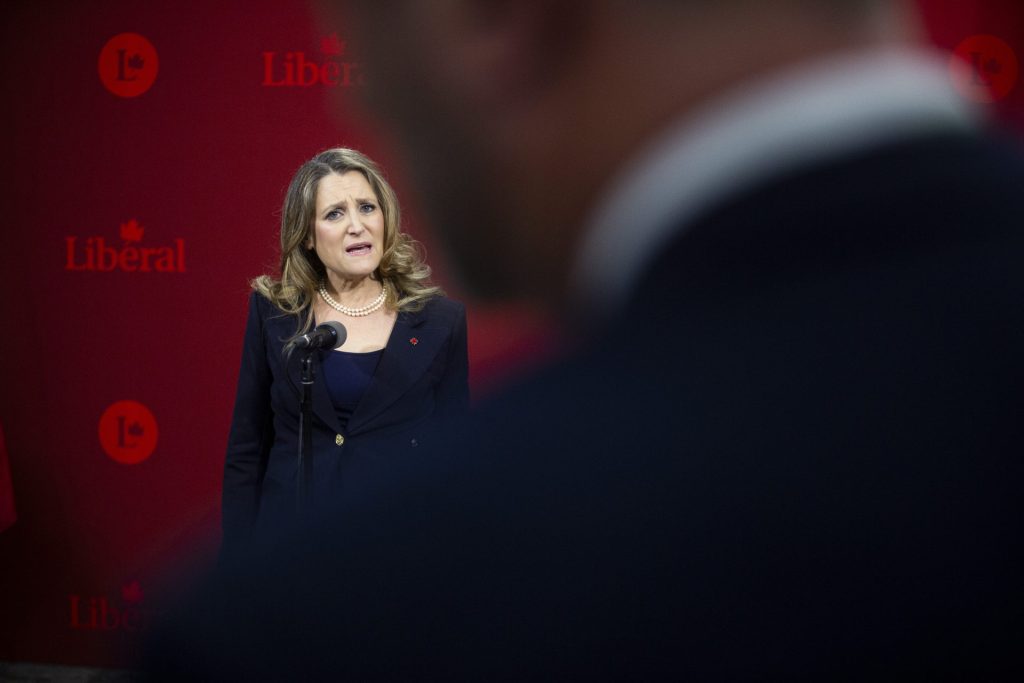
Gould was the first one to target her opponents with tough questions, putting front-runner Carney on the spot when she asked him what industries he would safeguard when negotiating with Trump, referencing Carney’s comments that he would protect some “over others” in the French debate.
“Which sectors you’re willing to protect but which sectors you would negotiate away?” Gould asked Carney.
“In a negotiation,” Carney replied, “if there are things that should never enter into the negotiation—language, culture, or water—you make clear at the start of the negotiation that they are off the table.”
Carney then highlighted Canada’s automobile sector as being “intimately interconnected” with the United States.
“We’re going to negotiate around maintaining a good deal for our auto sector, but that is not the same as accepting a bad deal,” added Carney.
Gould, Carney, and Freeland all used the conversation around Trump to target Poilievre. Carney said Poilievre “worships” Trump and uses his language, while both Freeland and Gould said the Conservative leader wants to “imitate” Trump and positioned the Liberals as standing up to the American president.
Gould called Poilievre “our version of Trump here at home,”and Freeland said “all he believes in is cut, cuts, cuts.”
Carney called out Poilievre for not getting his security clearance when it comes to foreign interference.
Defence spending disagreement
When it comes to Canada’s place in the world, all the candidates agreed Canada should turn its attention to international allies to shore up Canada’s economic resilience and defence.
That topic gave Gould an opportunity to go after Carney again—this time on Canada meeting its two-per-cent of GDP defence spending target.
“Mark, you talked about reaching NATO targets, but of all of us on stage, you plan to reach those not until 2030, but the imperative to do that is now. You talked about the fact that the Arctic is under threat. We don’t have time to wait for this. We have to actually make sure that we are investing here in Canada, reaching those targets, because our country, our sovereignty, is under threat,” said Gould.
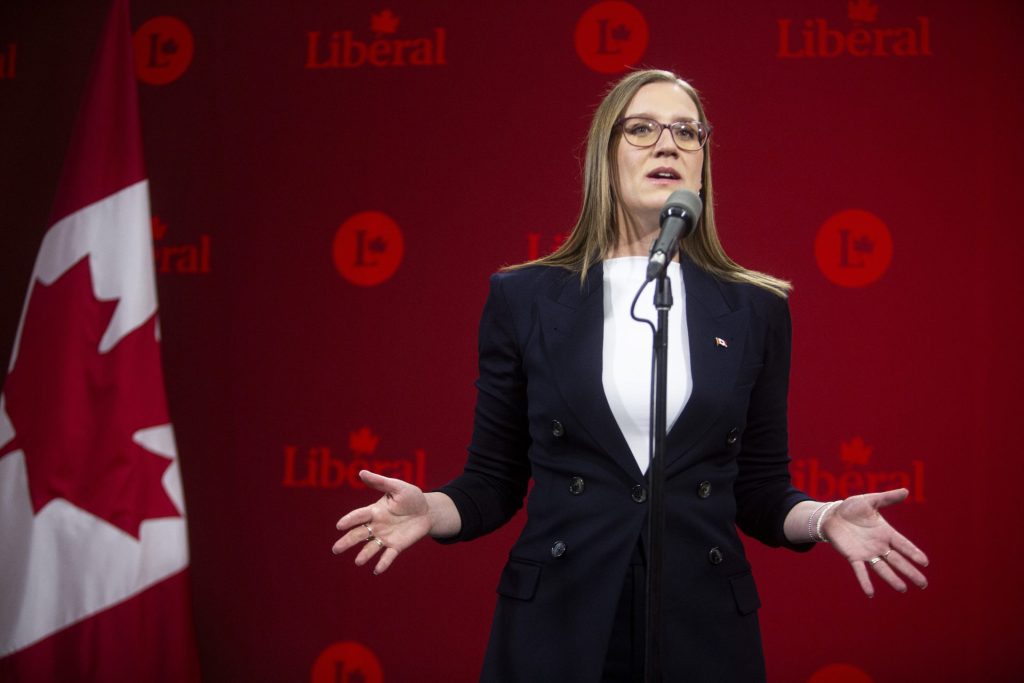
Carney responded that he promised by 2030,” adding “we will do it faster if we can deploy it faster,” calling it a management issue. The focus, he said, is on “delivering security” and not just “pushing money out the door.”
While Gould and Freeland both committed to meeting the two-per-cent target by 2027, both of them were part of a government that has yet to meet its NATO target.
Candidates spar over the economy
The cost of living crisis has been a key issue for Canadians post-COVID-19 pandemic lockdowns.
The candidates were asked about the rise in food banks usage—Canada hit a milestone last year with over two million visits to a food bank—and how they would address affordability.
Carney, Freeland, and Gould have said they would provide some sort of tax cut to help people deal with the high cost of living, while Baylis said the Canadian dollar needed to be made stronger to increase people’s purchasing power. He plans on boosting productivity to help improve Canadians’ economic fortunes.
During this economic segment, Carney took shots at the government’s track record on immigration and spending, and opened himself up to attacks from both Freeland and Gould.
Carney pointed to a “surge in immigration” that the government is now trying to control, and said government spending grew at “twice the rate of growth of our economy.”
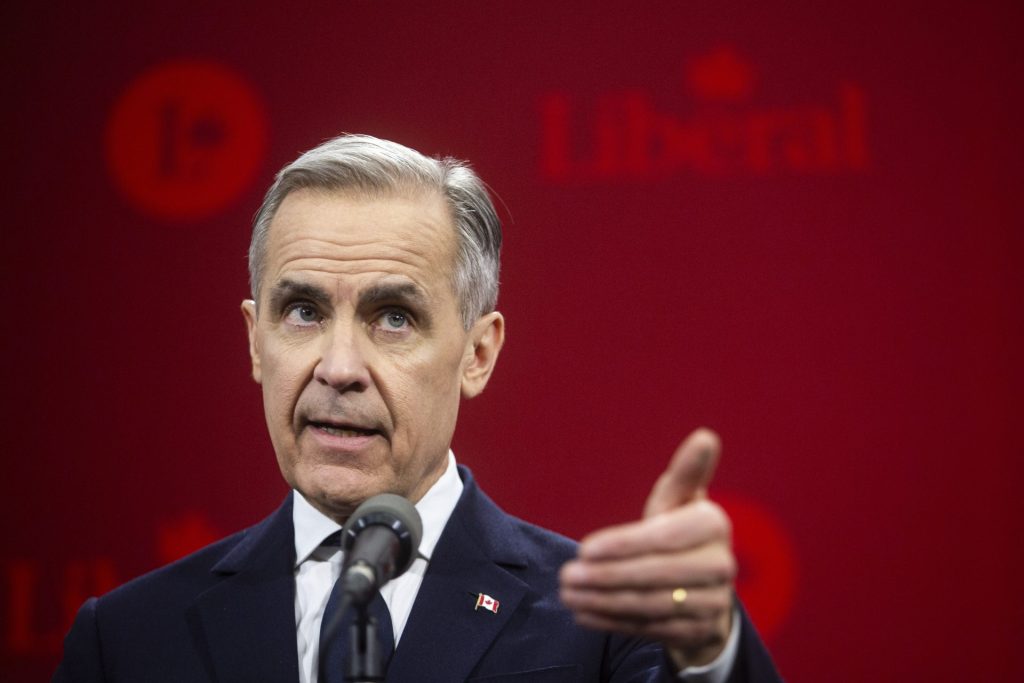
“So our economy was weak before we got to the point of these threats from President Trump,” said Carney. “That’s why we need big changes to how we’re managing this economy.”
Gould rebutted with “I’m not going to talk down Canada. I am only ever going to be a champion for this country,” while Freeland said “we need to be really careful not to repeat Conservative talking points.”
“Canada most definitely is not broken. We are a strong, resilient country,” Freeland said.
This section is where most of the candidates touted their financial credentials: Carney’s experience at Finance Canada assisting Paul Martin when he “balanced the books;” Freeland’s tenure as finance minister; and Baylis’ experience as a businessman. Gould highlighted her upbringing with a parent as a small business owner.
Housing and health care
Housing has also been a key ballot box issue. It’s an area where the Liberals have been criticized for acting too slow, and which provided an opening for Poilievre to dominate the agenda in the last couple years.
Gould is pledging to create an industrial housing strategy to help build millions of homes. Part of Freeland’s plan is to boost people in the trades to help increase homebuilding. Baylis said he wants to strengthen the economy so Canadians can afford homes by having higher-paying jobs. Carney said he wants to “double the rate of home building in this country.”
A perennial concern for Canadians is health care, and it was a focus Tuesday night. While it falls under provincial jurisdiction, the federal government has a role in ensuring Canadians have equitable access to quality health care.
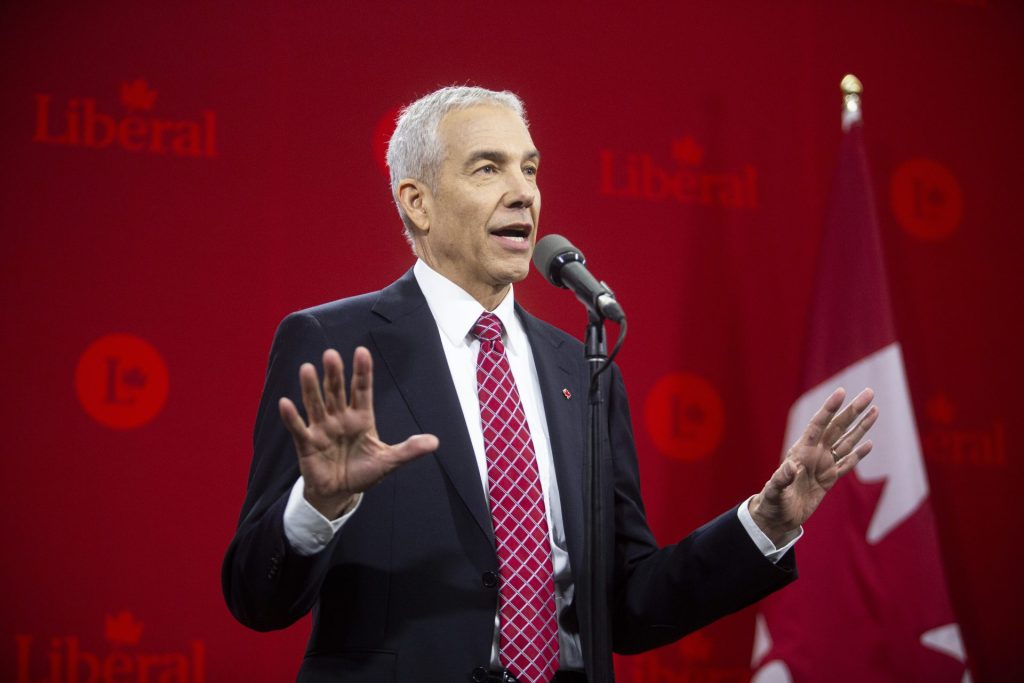
Carney said the federal government has to “meet our responsibilities” with health care transfers, but can do a lot more, including helping health care professionals work across the country.
“So a nurse in Quebec can go to Alberta, go to Northwest Territories and practice immediately. We have to make it easier for foreign health professionals to work more rapidly,” said Carney.
Gould said the feds can ensure there’s “greater accountability from provinces—not to the federal government—but to their own citizens on the outcomes.” She also said the federal government can expeditiously “recognize foreign-trained doctors and health-care professionals.”
Baylis said he would like to train more nurse practitioners to “allow them to do almost as much as a doctor” and invest more in home care.
Freeland focused on training “more doctors, nurses, nurse practitioners” and increasing their numbers “by recognizing foreign credentials, and by allowing credentials to be portable across the country.”
All the candidates have indicated that investing in new technologies could also help modernize the health-care system.
Carbon tax in focus
The carbon tax is where the candidates have most distanced themselves from Prime Minister Justin Trudeau (Papineau, Que.). Once a marquee plank in the Trudeau government’s climate plan, the leadership hopefuls have since indicated that they would either scrap, replace, or pause the consumer price on carbon.
Freeland did, however, give Trudeau props on his climate efforts: “I do want to start by recognizing the role that I think history is going to judge very positively, that Prime Minister Trudeau has played on climate action. He is the first Canadian prime minister to really move the dial.”
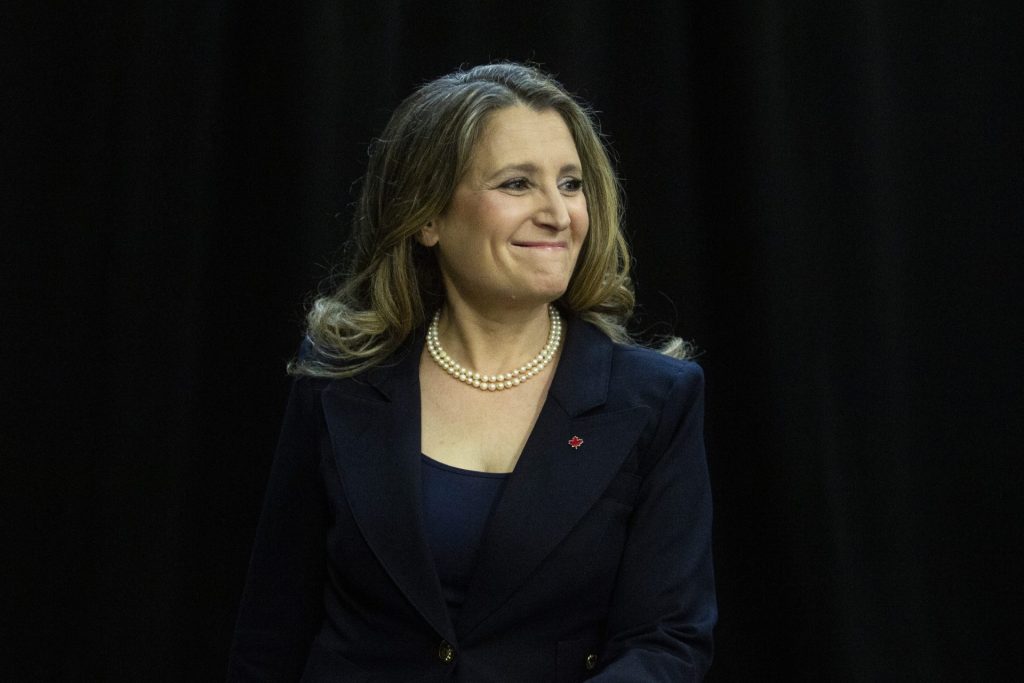
When it comes to pipelines, the candidates have also expressed their support of building more pipeline infrastructure in an effort to lessen Canada’s reliance on the U.S. Baylis has also proposed building two pipeline corridors to transport Canadian natural gas to European and Asian markets. Freeland’s platform said she would back an east-west pipeline if there was community and Indigenous support of the project
Distancing from Trudeau
Freeland entirely dodged a question about how candidates would differentiate themselves from Trudeau. His former deputy prime minister instead opted to continue on the previous question’s focus before the moderator returned to her to force a response after the other contenders had answered.
Freeland said Liberals should be proud of “the great things our government” has done.
“For me this campaign has been a personal liberation. I am my own person and it is great. I personally do not believe in a style of leadership which is a one-man band,” said Freeland, who described her style as “collaborative and listening” with a more “practical” approach.
Following Freeland’s first stab at the question, Gould, Trudeau’s former House leader, picked up Freeland’s focus, but pivoted to say she was “really proud of a lot of the work we did as a government.” But, Gould said she’d “stay connected with the grassroots.”
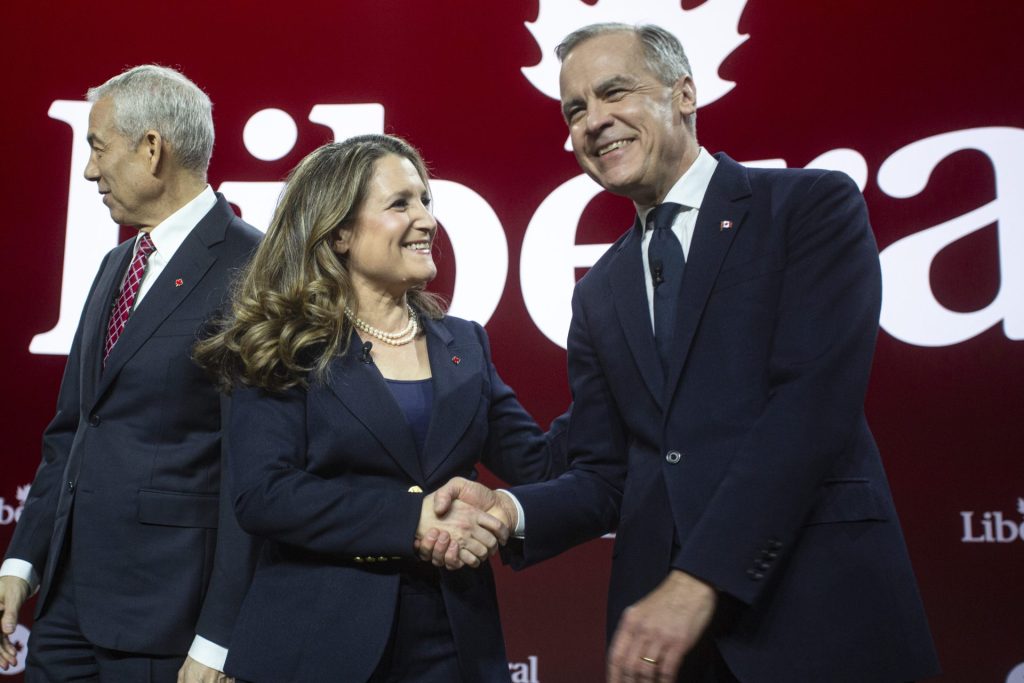
When pressed again by Thibedeau, Gould said she was “very proud” of the Liberal government’s record.
“We’ve made some mistakes. Absolutely nobody is perfect. We’ve done a lot of good things, and I think we need to pinpoint the moment.”
Baylis said he was the “most distant from Trudeau,” and would “differentiate greatly” by focusing more on the economy.
Carney closed the question saying he would have “laser focus on the economy,” and would be a “much more hands-on” manager focused on results. Noting his caucus support—which more than doubles Freeland’s MP endorsements—Carney said he would have “more regular and two-way dialogue” with MPs.
The Hill Times





 LICENSING
LICENSING PODCAST
PODCAST ALERTS
ALERTS













